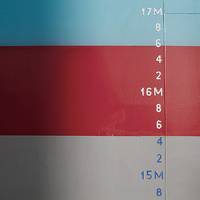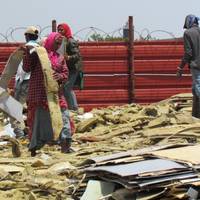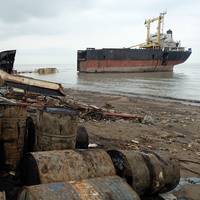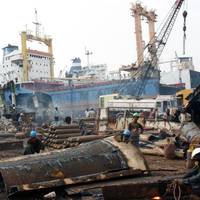97 German Ships Beached in South Asia in 2016
It may seem a big surprise for a country whose industry is proud of green technology and engineering solutions, but Germany is responsible for the worst shipbreaking practices among all shipping nations when one compares the size of its fleet to the number of ships broken irresponsibly, says the NGO Shipbreaking Platform. In 2016 German owners, banks and ship funds had 97 ships rammed up on the beaches of South Asia out of a total of 99 vessels sold for demolition, meaning 98 percent of all obsolete German ships ended up on a beach. In addition, close to 40 percent were broken in Bangladesh, where conditions are known to be the worst. Among the owners bringing the most ships to the beaches are Hansa Mare with 12 ships, Alpha Ship, F. Laeisz and Peter Doehle with seven each, and Dr.
78% Ships Dismantled in South Asian Beaches
The list of all ships dismantled around the world in 2016, which the NGO Shipbreaking Platform has compiled and analysed, shows no improvements of the shipping industry’s management of its end-of-life vessels. Far from it: the Platform today releases data that indicate an increase in the number of ships sold for polluting and unsafe shipbreaking on the beaches of South Asia. In 2016, a total of 668 vessels were broken on tidal beaches, that is as much as 87% of all tonnage dismantled globally. “The shipping industry is nowhere close to ensuring sustainable ship recycling practices. Last year, we saw not only an increase in the market share for dangerous and dirty shipbreaking, but also a record-breaking number of EU-owned vessels on the South Asian beaches.
Five Die at Gadani Shipbreaking Yard
Five shipbreaking workers were killed and one injured in a fire that took place in the shipbreaking yards of Gadani, Pakistan, Monday morning. The deadly fire broke out on board of the beached vessel GAZ FOUNTAIN (IMO 8406054). The LPG tanker’s last beneficial owner was the Greek shipping line Naftomar. The vessel’s name was changed to RAIN and its Panama flag swapped for the end-of-life flag Comoros just before the last voyage – a clear indicator of the use of a cash buyer. The accident occurred at yard n° 60, owned by Rizwan Diwan Farooq, the former president of the Pakistan Ship Breakers’ Association. According to reports by newspaper The Dawn, Farooq was detained after having fled the yard. The newspaper reported that the fire broke out due to a “chemical foam” present in the ship.
Ship Breaking Worker Killed in the Yard
Only in 2016, at least 19 shipbreaking workers were killed and another 11 severely injured in the Bangladesh shipbreaking yard. More than 600 German-owned ships have been sold for scrap in SouthEast Asia since 2008 due to insolvencies and financial problems claims NGO Shipbreaking Platform. A worker named Shah Jahan was killed on December 04 on the spot at Arefin shipbreaking yard in Chittagong, Bangladesh, where German container ship “Viktoria Wulff” (IMO 9252101) is currently being dismantled on the beach, says NGO. The 35-year old man, who was made to work without any safety measures, was struck on the head by a heavy iron piece. German ship owner Wulff went bankrupt in August and the insolvency administrator is currently selling off the company’s remaining vessels.
NGO Shipbreaking Calls for ‘Polluter Pays’ Principle
The NGO Shipbreaking Platform called today on the European Commission, the European Parliament and Member States to support the introduction of a financial mechanism that will enhance safe and environmentally sound ship recycling in line with the standard set by the European Ship Recycling Regulation. The NGO Shipbreaking Platform asks the EC to develop a legislative proposal in order to implement the polluter pays principle for ship owners with a European Ship Recycling Licence. “Ship owners are all up in arms against an EU Ship Recycling License. A surprise? No. The shipping industry has been on the go for the last 15 years trying hard to fight off regulation that would really hold them accountable for dirty and dangerous shipbreaking practices.
Maersk to Scrap Ships at India's Alang Beaches, NGO Dismayed

Maersk Line said on Friday it had chosen four shipbreaking yards along India's Alang beaches to handle an increase in vessels that need to be scrapped, to the dismay of some organisations that say the operations there are polluting and unsafe. The world's largest container shipper says the four yards in the Alang coast of western India have been certified according to the Hong Kong Convention -- health, safety and environmental standards developed by the International Maritime Organisation.
Shipbreaking Practices in 2015 Reveal Appalling Record -Report
Ignoring industry leaders and human rights and environmental organizations, ship owners continue to profit from dangerous and dirty shipbreaking practices on South Asian beaches in 2015, according to new data released today by the NGO Shipbreaking Platform. Of the 768 large oceangoing vessels sold to the scrap yards last year, 469 were broken on the beaches of India, Pakistan and Bangladesh where shipbreaking yards often do not provide fundamental labor rights, ignore international waste trade law and fail to respect international environmental protection standards. One of many accidents that killed or maimed shipbreaking workers last year was a major gas explosion at Shitol Enterprise, a shipbreaking yard in Bangladesh.
European List of Certified Ship Recycling Facilities
The European Commission has opened the application procedure for the European List of ship recycling facilities last Friday, 18 December. Facilities located outside EU Member States are now invited to submit their applications before 1 July 2016. The European Commission will review the applications and then publish a first version of the European List before 31 December 2016 in accordance with the EU Ship Recycling Regulation. Early in 2016, the EC will also issue guidelines on the requirements for ship recyclers and independent verifiers certifying the yards. Apart from holding a licence in their respective country, facilities intending…
EU to Ban Scrapping Ships on South Asian Beaches
Over 60 pct of ships scrapped on Asian beaches in 2014. Practice poses human risk, environmental dangers. New EU rules set high standards, but with loopholes. European, Turkish and Chinese recyclers are set to benefit from strict new EU rules on breaking up old ships, but the practice of dismantling them on beaches in South Asia - at great human and environmental cost - will still be hard to stop. Of 1,026 ocean-going ships recycled in 2014, 641 were taken apart on beaches in India, Bangladesh and Pakistan, according to figures from the NGO Shipbreaking Platform, which campaigns for an end to the hazardous practice. Tankers, cruise liners and other old vessels are rammed onto beaches and stripped down by hundreds of unskilled workers using simple tools such as blowtorches.
South Asian Beaches the Target of New EU Ship Recycling Rules
European, Turkish and Chinese recyclers are set to benefit from strict new EU rules on breaking up old ships, but the practice of dismantling them on beaches in South Asia at great human and environmental cost will still be hard to stop. Of all 1,026 ocean going ships recycled in 2014, 641 were taken apart on beaches in India, Bangladesh and Pakistan, according to figures of the NGO Shipbreaking platform, which campaigns for an end to hazardous scrapping on beaches. In South Asia, tankers, cruise liners and other old ships are rammed onto a beach, with hundreds of unskilled workers then taking apart the vessels with simple tools such as blowtorches. Chemicals leak into the ocean when the tide comes in. There is also a human cost.
Report: Dire Conditions in Indian Shipbreaking Yards

The working and living conditions at the shipbreaking yards of Alang, India, remain alarmingly poor, argues a new study published in the Economic & Political Weekly, an Indian Social Science journal. The research was commissioned and financed by the National Human Rights Commission of India (NHRC) and was coordinated by Dr. Geetanjoy Sahu from the Tata Institute of Social Sciences (TISS). TISS’ findings are based on field work in Alang from April 2013 to May 2014 including interviews with 300 shipbreaking workers as well as stakeholders from the industry, trade unions and authorities.
Documentary Examines Shipbreaking Practices in Bangladesh

A new documentary titled "Giftiger Tankerschrott für Bangladesch - Toxic ships for Bangladesh" will be shown this Sunday, October 26 on German state TV channel ZDF. The documentary, filmed by a team of the national German TV channel last month in Chittagong, one of the world's largest shipbreaking sites, follows Patrizia Heidegger, Executive Director of the NGO Shipbreaking Platform, and Muhammed Ali Shahin, the Platform's Bangladesh project coordinator, as they meet with the workers, some of them children, and their families.
Report Examines Dutch Banks’ Approach to Shipbreaking

The NGO Shipbreaking Platform, a global coalition of human rights, labor rights and environmental organizations working to prevent dangerous and dirty ship recycling practices worldwide, has made available a report titled Case study: Dutch banking groups and shipbreaking on its website. This is the English version of a report initially published by the Dutch consultancy Profundo, on behalf of the Eerlijke Bankwijzer (Fair Bank Guide), an initiative that aims at providing information to the public on how banks invest their funds, and FNV Mondiaal, a trade union organization.
European Ship Recycling Fund Called For
NGOs support EU Parliament Environment Committee call for ship recycling fund and off-the-beach stance. NGOs have applauded a breakthrough vote by a large majority of Members of the Environment Committee of the European Parliament (ENVI), across all political groups, to create a Europe-wide ship recycling fund, an economic incentive to finance environmentally sound ship recycling and internalise the costs of proper hazardous waste management. The fund is supported by the NGO Shipbreaking Platform, a global coalition of 18 environmental, human rights and labour rights organisations working for safer and cleaner ship recycling practices worldwide.









